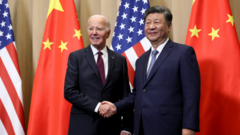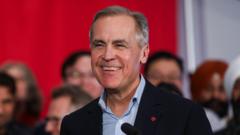In a recent meeting on the sidelines of the APEC summit in Peru, Xi Jinping expressed his commitment to work with Donald Trump as the two nations navigate the transition of power and associated geopolitical dynamics.
Xi Jinping and Trump Prepare for New Chapter in US-China Relations

Xi Jinping and Trump Prepare for New Chapter in US-China Relations
Chinese President Emphasizes Cooperation Amid Transition to Trump Administration
On Saturday during the Asia-Pacific Economic Cooperation (APEC) summit in Peru, Chinese leader Xi Jinping spoke with outgoing President Joe Biden, emphasizing a collaborative path forward with incoming President Donald Trump. This encounter showcased the leaders’ recognition of the complexities and fluctuations in US-China relations throughout Biden's administration. Despite past hurdles, both Xi and Biden noted the progress made in diminishing tensions over critical issues like trade and Taiwan.
Analysts anticipate that relations may experience heightened volatility with Trump's reinstatement, particularly due to his promised significant increase in tariffs on Chinese products—as high as 60%. Trump’s approach has historically branded China as a "strategic competitor," and relations soured after he referred to Covid-19 as a "Chinese virus."
Inside a Lima hotel, Xi articulated Beijing's steadfast intention to cultivate a stable relationship with the US. “China is prepared to collaborate with the upcoming US administration to sustain dialogue, enhance cooperation, and navigate our differences,” he stated. Conversely, Biden underscored that while competition is inherent, it must not escalate into conflict, affirming the importance of responsible management of the bilateral relationship.
While Biden's presidency has seen strifes—such as the spy balloon incident and heightened military tensions around Taiwan—his administration aimed for a more responsible stance compared to Trump's aggressive dealings. Analysts suggest that the unpredictability of Trump's return could create additional anxiety in Beijing. Bonnie Glaser from the German Marshall Fund noted that while China is inclined towards discussions and immediate engagement with Trump's team, they are also prepared to retaliate against any aggressive tariff policies.
Acknowledging the historical disagreements between the nations, Biden characterized his dialogues with Xi as “frank” and “candid,” noting three face-to-face meetings during his tenure, including a pivotal summit in San Francisco focused on drug trafficking and climate initiatives. Yet, Biden has also sustained some of Trump’s tariffs, imposing restrictions on Chinese electric vehicles and solar panels, while reinforcing defense alliances throughout the Asia-Pacific region in reaction to China’s assertiveness.
As the political landscape evolves, the world watches closely how the incoming Trump administration will navigate these complex US-China issues, shaping not only bilateral relations but also global geopolitics.
Analysts anticipate that relations may experience heightened volatility with Trump's reinstatement, particularly due to his promised significant increase in tariffs on Chinese products—as high as 60%. Trump’s approach has historically branded China as a "strategic competitor," and relations soured after he referred to Covid-19 as a "Chinese virus."
Inside a Lima hotel, Xi articulated Beijing's steadfast intention to cultivate a stable relationship with the US. “China is prepared to collaborate with the upcoming US administration to sustain dialogue, enhance cooperation, and navigate our differences,” he stated. Conversely, Biden underscored that while competition is inherent, it must not escalate into conflict, affirming the importance of responsible management of the bilateral relationship.
While Biden's presidency has seen strifes—such as the spy balloon incident and heightened military tensions around Taiwan—his administration aimed for a more responsible stance compared to Trump's aggressive dealings. Analysts suggest that the unpredictability of Trump's return could create additional anxiety in Beijing. Bonnie Glaser from the German Marshall Fund noted that while China is inclined towards discussions and immediate engagement with Trump's team, they are also prepared to retaliate against any aggressive tariff policies.
Acknowledging the historical disagreements between the nations, Biden characterized his dialogues with Xi as “frank” and “candid,” noting three face-to-face meetings during his tenure, including a pivotal summit in San Francisco focused on drug trafficking and climate initiatives. Yet, Biden has also sustained some of Trump’s tariffs, imposing restrictions on Chinese electric vehicles and solar panels, while reinforcing defense alliances throughout the Asia-Pacific region in reaction to China’s assertiveness.
As the political landscape evolves, the world watches closely how the incoming Trump administration will navigate these complex US-China issues, shaping not only bilateral relations but also global geopolitics.






















